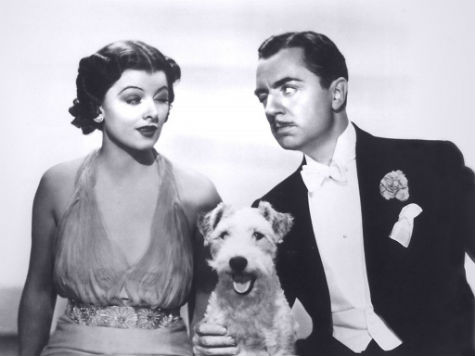
Ah, to be a mystery fan in the 1930s…
Pulp fiction was rife with the jaded private eye. Magazines like Black Mask brimmed with femme fatales. Cigarette smoke filled rooms dimly lit and latticed by half-opened blinds. Raymond Chandler's Philip Marlowe and Dashiell Hammett's Sam Spade stalked the crime-ridden alleys in search of answers, the collars of their trench coats flipped up against the rain.
Yes, sir, it was a good time for the atmospheric crime drama. But amidst all of the grit and grime and deadly affairs, one pair of sleuths stands out.
He's a retired private eye and knows his way around a gun, yes, but he also prefers to go for the light quip and glass of bourbon when his back is against the wall. She's his wealthy socialite wife, more than prepared to match him glass for glass and quip for quip.
In the murky sea of noir, Nick and Nora Charles stand out because, well, they're fun. They're goofy and witty and obviously fond of each other. There's never any question that their trust in each other is anything less than absolute. They indulge in booze and physical comedy, can't resist cracking jokes at the suspects' expense, and dance around the mayhem in a light two-step where other private eyes would brood or glower.
When Dashiell Hammett created the pair in his novel The Thin Man, he probably couldn't have imagined how popular they would become — or that his single novel would inspire a series of six comical whodunit films.
In some ways, the pair have even eclipsed his more serious characters Sam Spade and The Continental Op. (At the very least, the pair and their faithful terrier, Asta, have been featured in more crossword puzzles.)
If you're in the mood for some caviar and champagne crime, you couldn't do better than a day-long marathon of the The Thin Man film series. Here are some of the highlights from each:
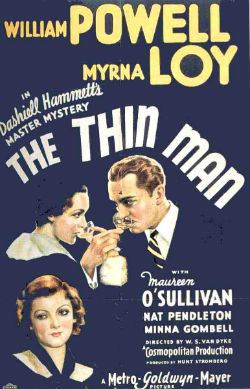 The Thin Man (1934)
The Thin Man (1934)
The first and finest. We meet Nick (the ever dashing William Powell) as he's confidently wielding a cocktail shaker at a hotel bar. Nora (the always elegant Myrna Loy) joins him moments later in an epic pratfall. The rapier wit that defines the pair is immediately on display.
“Pretty girl,” Nora comments after meeting Dorothy Wynant (Maureen O'Sullivan).
“Yes, she's a very nice type,” Nick responds.
“Oh? You got a type?”
“Only you, sweetheart,” he assures. “Lanky brunettes with wicked jaws.”
The Christmas presents haven't been opened before Nick finds himself enmeshed in the mystery of a missing inventor (the actual Thin Man of the title — contrary to popular belief) and his murdered lover/secretary. Nora, meanwhile, is thrilled to finally see her ex-PI husband in action.
The party Nick and Nora throw in their hotel room, full of drunken cons singing Christmas carols, a parade of suspects desperate to talk to Nick, reporters angling for interviews, and dozens of glasses of booze (filming started not long after the repeal of Prohibition and the entire cast is perpetually pickled) is a standout.
It's even more impressive when you realize that director W.S. Van Dyke (known as “One-Take Woody”) filmed the entire picture in just over two weeks, so such complicated sequences were done at a running pace.
And, of course, the climactic dinner when Nick uncovers everyone's secrets and reveals the murderer while Nora plays the consummate hostess (“Waiter, can you serve the nuts? I mean, can you serve the guests the nuts?”) is a riot.
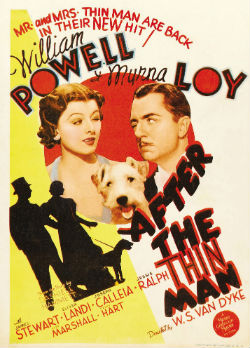 After the Thin Man (1936)
After the Thin Man (1936)
This first sequel is a solid film, too. It's New Years, and the Charles have finally returned home to California only to find that Nora's cousin is having serious trouble with her playboy husband. No sooner have they tracked the wayward hubby down at a Chinese restaurant when he gets himself shot — but by who?
Cousin Selma (Elissa Landi), who was going mad with jealousy? Her jilted but devoted ex-paramour David (Jimmy Stewart, in one of his first roles)? One of the several shady characters from the restaurant?
Asta gets up to some mischief with a clue, Nora is mistakenly thrown into jail, Nick has a shootout in a basement, and the verbal volleys are as fun as the first film.
“You see, when it comes to words like that,” Nick explains regarding a note left by the murderer, “an illiterate person—”
“Whaddaya mean 'illiterate'?” suspect Polly interrupts. “My father and mother were married right here in the city hall!”
The dinner at Aunt Katherine's, where Nick mocks all of the sleeping gentlemen around the table, is laugh-out-loud funny thanks to Powell's superb comedic timing. As Roger Ebert once said, William Powell “is to dialogue as Fred Astaire is to dance. His delivery is so droll and insinuating, so knowing and innocent at the same time, that it hardly matters what he's saying.”
Another Thin Man (1939)
Nick and Nora have a new addition to the family at this point, baby Nicky (when asked, Nick explains: “Well, we have a dog, and he was lonesome.”). The family heads to the countryside when the family lawyer, Colonel McFay (C. Aubrey Smith), demands they come and prevent his murder. Seems a disreputable man from his past is threatening him, and the lawyer is convinced Nick is the only one who can save him.
Turns out the Charles' presence doesn't deter the murderer — the old man dies that very night, Nick's almost shot by another guest, and someone kills McFay's daughter's dog. It's a big mess and the police are willing to accuse anyone, including our sleuths.
Of course, Nick convinces them he's of more use to them as a detective than a suspect, and gets to the bottom of a tangled web of inheritances and double lives. But not before a slew of friendly ex-cons (“That time he caught me was a fluke,” is a constant refrain from the good-natured criminals who refuse to hold a grudge with the dapper private eye.) throw a birthday party for little Nicky and Nora does some sleuthing of her own, leading to a hilarious interlude at a club when a would-be lothario tries to sweep her off her feet.
“How did you find me here?” Nora asks when Nick intrudes.
“I saw a great group of men standing around a table. And I knew there was only one woman in the world who could attract men like that. A woman with a lot of money.”
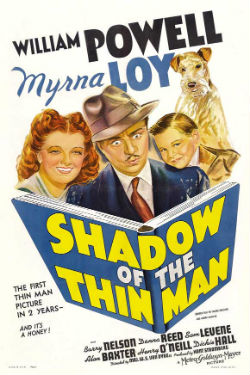 Shadow of the Thin Man (1941)
Shadow of the Thin Man (1941)
It's off to the races when Nick and Nora accidentally find themselves right on the scene following the shooting of a jockey. Goldez was known to throw the occasional race for the big-time bookies in town, and the police hoped he'd turn state's evidence. Until he ended up dead in the showers, that is.
And before the clamor can die down, there's another shooting: this time it's a reporter named Whitey (Alan Baxter), who had been giving the bookies good press and had just tangled with crusading journalist — and a pal of Nick's — Paul Clark (Barry Nelson).
The police want to pin both crimes on Paul, but Nick and Nora have something to say about that. With a little digging, the real truth comes out about a racketeering syndicate with deeper ties than anyone suspected.
Director Van Dyke often said that he made a mistake in giving Nick and Nora a kid so early in the series, and that really shows in this film. After a couple of short scenes in the beginning of the movie, Nick Jr. disappears to allow his parents the time and space they need to really shine.
There's a hysterical wrestling match where Nora gets so caught up in the spirit she puts her hubby in a headlock and Nick catches up with old pal “Spider” Webb. Asta's pursuit of a suspect leads to a wild brawl in an Italian restaurant. And Mrs. Charles gets to be a hero when she lunges at the armed murderer during the big reveal.
“Here ya are, Mommy,” Nick says proudly, handing her a diamond bracelet as the murderer is dragged away by the police. “For valor.”
“Is this one for keeps?” she asks.
“Yep — and so is this,” he assures, planting a fond kiss on her cheek.
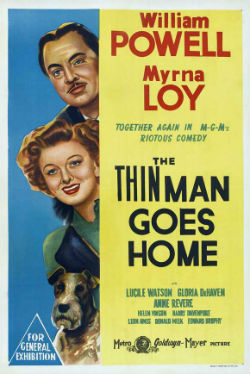 The Thin Man Goes Home (1945)
The Thin Man Goes Home (1945)
It's Nick's birthday, so he and Nora go home to the sleepy town of Sycamore Springs to spend it with his parents. In New York and San Francisco, Nick's a big deal — but his doctor father has always been more disappointed than impressed by his son's choice to be a detective rather than a medical man. “If you ever got a pat on the back from your father,” says Nora, “I think you'd pop your vest buttons.”
(She also does a spirited re-enactment of one of Nick's cases in the hopes of impressing Dr. Charles (Harry Davenport), which only leads to him dryly insisting the whole mess would've been more easily solved if only his son had had the opinions of a medical man.)
Of course, Nick's arrival in Sycamore Springs suggests to the townsfolk that he must be on the trail of a case, despite his assurances that it's only a vacation. When a young stranger arrives on the doorstep frantic to talk to Nick about something — only to drop down dead from a silent bullet seconds later — everything has the air of a self-fulfilling prophecy.
The case involves the local cuckoo, Crazy Mary (Anne Revere), and a secret baby given up over twenty years ago, as well as a plot to steal airplane plans (the story being set in the midst of WWII) and a shoddy painting several people are unusually determined to obtain. Naturally, Nora ends up buying it for Nick's birthday present unaware of its true value.
There's a silly sequence where Nora follows the suspicious Brogan (Edward Brophy), and is in turn followed by the suspicious Mr. Draque (Leon Ames), through a smoky pool hall and straight into a brawl. Then, hot on the trail of the painting, Nick foists the missus off on a spirited sailor eager for a jitterbug partner.
Nora has a lot of trouble with a folding chair, Nick wears a silly high school shirt, and the reveal is typically convoluted and surprising. The sleuths may have forgone their usual martinis and cocktails in this thanks to Dr. Charles' views on alcohol — and it may not be as madcap as the previous outings — but there are still some fun character moments and zingers.
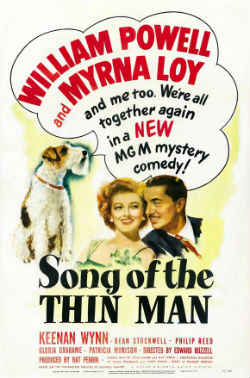 Song of the Thin Man (1947)
Song of the Thin Man (1947)
A charity cruise is rudely interrupted when the bandleader — a gambler and lout named Tommy Drake (Phillip Reed), who had no lack of enemies — is gunned down while pawing through a safe. The police are pretty sure Phil Brant (Bruce Cowling), the victim's biggest rival, is responsible because he made a quick getaway right after the murder.
But Brant claims he was in a hurry because he and his ladylove Janet Thayar (Jayne Meadows) were eloping due to her parents' disapproval, and turn to Nick and Nora for help in clearing his name.
Was the murder a case of mistaken identity? The victim looked an awful lot like Brant, and the murder weapon turns out to be an antique owned by Janet's father. Or perhaps the clarinet player in the band, Buddy Hollis (Don Taylor), who was fired by Drake and has cracked up due to alcoholism, is the real culprit. Or maybe the murder had something to do with the $12,000 Drake owed the nefarious Al Amboy (William Bishop)?
Nick and Nora are quite adrift in this jazzy music scene full of hepcats and slang. Luckily they have musician Clinker (Keenan Wynn) to help them navigate the smoky jam sessions.
“Clinker, you have the nose of a bloodhound,” praises Nick.
“Don't worry — the rest of your face looks fine,” assures Nora.
True to his usual method, Nick gathers all of the suspects for a dramatic reveal, which turns out to be a double reveal, and the Charles' last case goes out on a definite bang.
“Mommy, I am retiring,” says Nick.
“From crime?” asks Nora.
“To bed. Good night!”
It's true that the series viewed as a whole proves the theory of 'diminishing returns'; the last couple of films are hardly the humdingers the first were. But even the lesser Nick and Nora films are more fun than some of the gritty crime dramas Hollywood churns out today.
Every couple of years, rumors start up again that a Thin Man reboot is in the works. And while part of me would love to see a fresh take on the ultimate sleuthing couple, another fears an update would never compare to the effortless charm and comedic timing of Powell and Loy. You really can't improve upon perfection, after all.
Angie Barry wrote her thesis on the socio-political commentary in zombie films. Meeting George Romero is high on her bucket list, and she has spent hours putting together her zombie apocalypse survival plan. She also writes horror and fantasy in her spare time, and watches far too much Doctor Who. Come find the angie bee at Tumblr.
Read all posts by Angie Barry at Criminal Element.

I just pulled my beat-up paperback copy of The Thin Man off the shelf to find the tally I made alcoholic drinks in the novel:
Nick 32
Nora 14
Everyone else 35
I didn’t tally the cigarettes, but I seem to recall that their number is staggering.
So easygoing, so carefree! I love this movie series and all the characters involved!
I’ve been looking everywhere for the title of the prequel to this series & naturally it’s not listed here. It was on PBS once, I taped it & I can’t find the tape now. It was how Nick & Nora met, she was a sociallite & he was on a case with some woman playing as his wife while he was solving whatever case he was on.